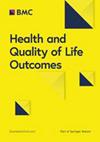Longitudinal course and predictors of health-related quality of life, mental health, and fatigue, in non-hospitalized individuals with or without post COVID-19 syndrome
IF 3.2
2区 医学
Q1 HEALTH CARE SCIENCES & SERVICES
引用次数: 0
Abstract
Long-term information on health-related quality of life (HRQOL) and mental health of non-hospitalized individuals with „post COVID-19 syndrome“ (PCS) is scarce. Thus, the objectives of the present study were to compare HRQOL and mental health of individuals with and without PCS in a German sample of non-hospitalized persons after SARS-CoV-2 infection, to characterize the long-term course up to 2 years and to identify predictors for post COVID-19 impairments. Individuals with past SARS-CoV-2 infection were examined at the University Hospital of Augsburg from November 2020 to May 2021 and completed a postal questionnaire between June and November 2022. Participants who self-reported the presence of fatigue, dyspnea on exertion, memory problems or concentration problems were classified as having PCS. HRQOL was assessed using the Veterans RAND 12-Item Health Survey, mental health was measured by the Patient Health Questionnaire and the Fatigue Asessment Scale was used to assess fatigue severity. Multivariable linear regression models with inverse probability weighting were used to determine the association between PCS and health outcomes. From the 304 participants (58.2% women, median age 52 years), 210 (69.1%) were classified as having PCS in median 26 months after SARS-CoV-2 infection. Persons with PCS showed significantly more often depressive and anxiety disorders. PCS was independently and significantly associated with higher levels of depression, post-traumatic stress and fatigue, as well as poorer physical and mental HRQOL in median 9 months as well as 26 months after SARS-CoV-2 infection. A large number of acute symptoms and a prior diagnosis of depression were independently associated with poor mental health and HRQOL. While post-traumatic stress and mental HRQOL improved from 9 months to 26 months post infection onset, depressiveness, fatigue and physical HRQOL remained stable in both, persons with and without PCS. PCS in non-hospitalized persons after SARS-CoV-2 infection is often associated with long-term impairments of mental health and HRQOL outcomes.患有或未患有 COVID-19 后综合征的非住院病人与健康相关的生活质量、心理健康和疲劳的纵向过程和预测因素
有关 "COVID-19 后综合征"(PCS)非住院患者的健康相关生活质量(HRQOL)和心理健康的长期信息很少。因此,本研究的目的是比较德国样本中感染 SARS-CoV-2 后未住院患者中患有和未患有 PCS 的人的 HRQOL 和心理健康情况,描述长达 2 年的长期病程,并确定 COVID-19 后损害的预测因素。2020 年 11 月至 2021 年 5 月期间,曾感染过 SARS-CoV-2 的人员在奥格斯堡大学医院接受了检查,并于 2022 年 6 月至 11 月期间填写了一份邮寄问卷。自我报告存在疲劳、劳累时呼吸困难、记忆问题或注意力不集中的参与者被归类为 PCS 患者。HRQOL 采用退伍军人兰德 12 项健康调查进行评估,心理健康采用患者健康问卷进行测量,疲劳评估量表用于评估疲劳严重程度。采用反概率加权的多变量线性回归模型来确定 PCS 与健康结果之间的关系。在 304 名参与者(58.2% 为女性,中位年龄为 52 岁)中,有 210 人(69.1%)在感染 SARS-CoV-2 后的 26 个月中被归类为 PCS 患者。PCS 患者的抑郁和焦虑症发病率明显较高。在感染 SARS-CoV-2 后的中位 9 个月和 26 个月中,PCS 与抑郁、创伤后应激和疲劳程度较高以及身体和精神 HRQOL 较差有明显的独立关联。大量急性症状和先前的抑郁症诊断与心理健康和 HRQOL 差异有独立联系。虽然创伤后应激和心理上的 HRQOL 在感染发病后 9 个月至 26 个月期间有所改善,但抑郁、疲劳和身体上的 HRQOL 在感染 PCS 和未感染 PCS 的人群中均保持稳定。非住院病人感染 SARS-CoV-2 后的 PCS 常常与心理健康和 HRQOL 的长期损害有关。
本文章由计算机程序翻译,如有差异,请以英文原文为准。
求助全文
约1分钟内获得全文
求助全文
来源期刊
CiteScore
7.30
自引率
2.80%
发文量
154
审稿时长
3-8 weeks
期刊介绍:
Health and Quality of Life Outcomes is an open access, peer-reviewed, journal offering high quality articles, rapid publication and wide diffusion in the public domain.
Health and Quality of Life Outcomes considers original manuscripts on the Health-Related Quality of Life (HRQOL) assessment for evaluation of medical and psychosocial interventions. It also considers approaches and studies on psychometric properties of HRQOL and patient reported outcome measures, including cultural validation of instruments if they provide information about the impact of interventions. The journal publishes study protocols and reviews summarising the present state of knowledge concerning a particular aspect of HRQOL and patient reported outcome measures. Reviews should generally follow systematic review methodology. Comments on articles and letters to the editor are welcome.

 求助内容:
求助内容: 应助结果提醒方式:
应助结果提醒方式:


